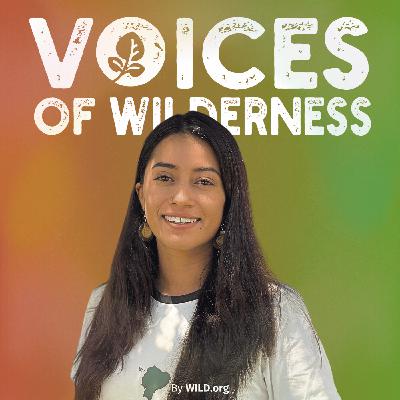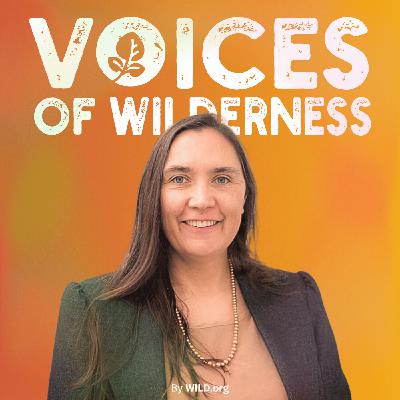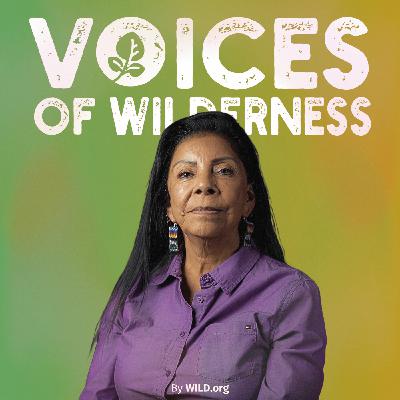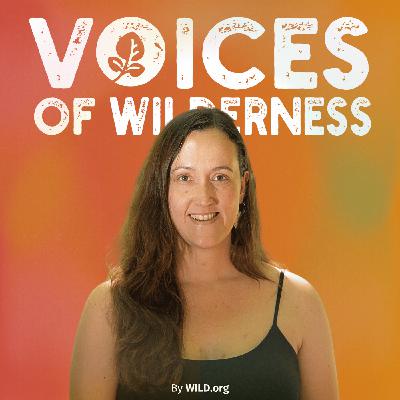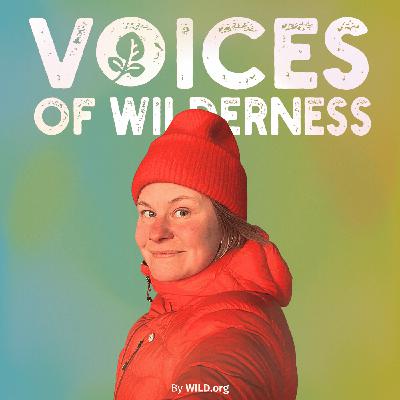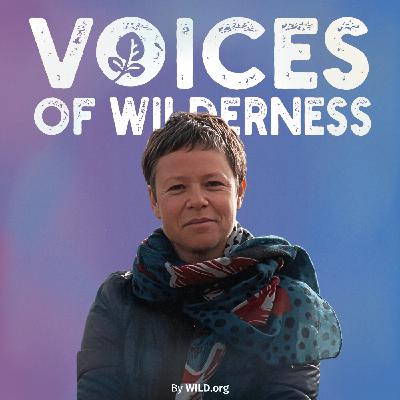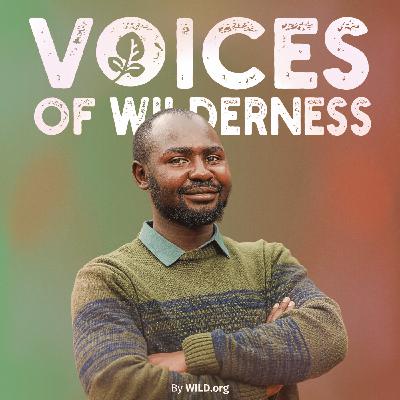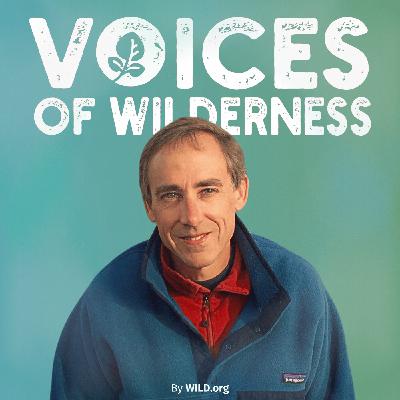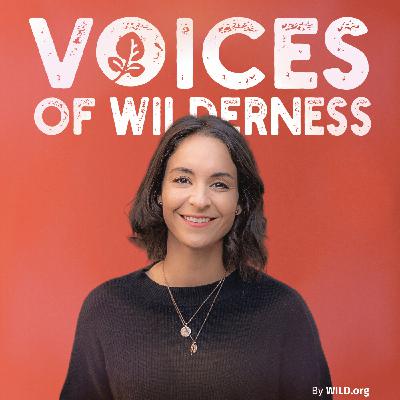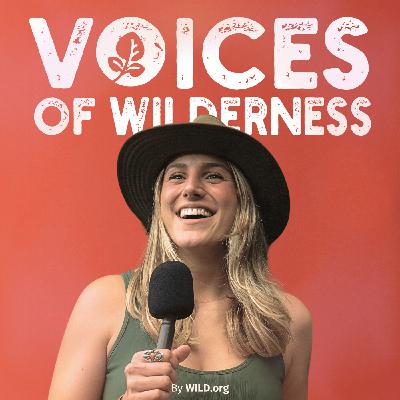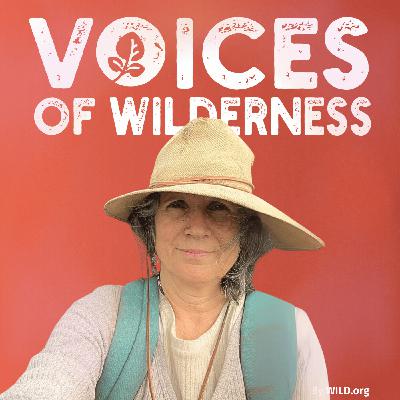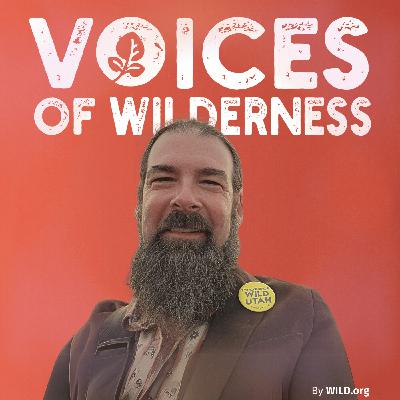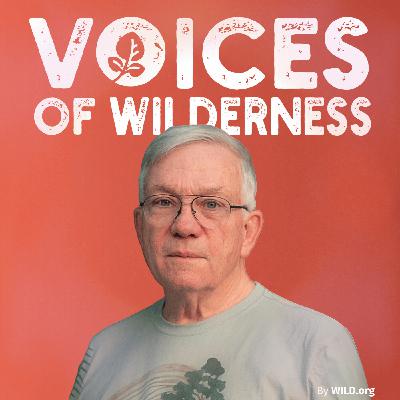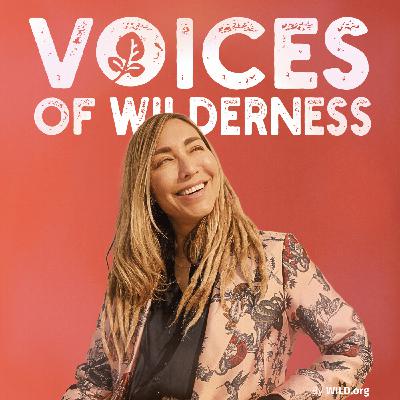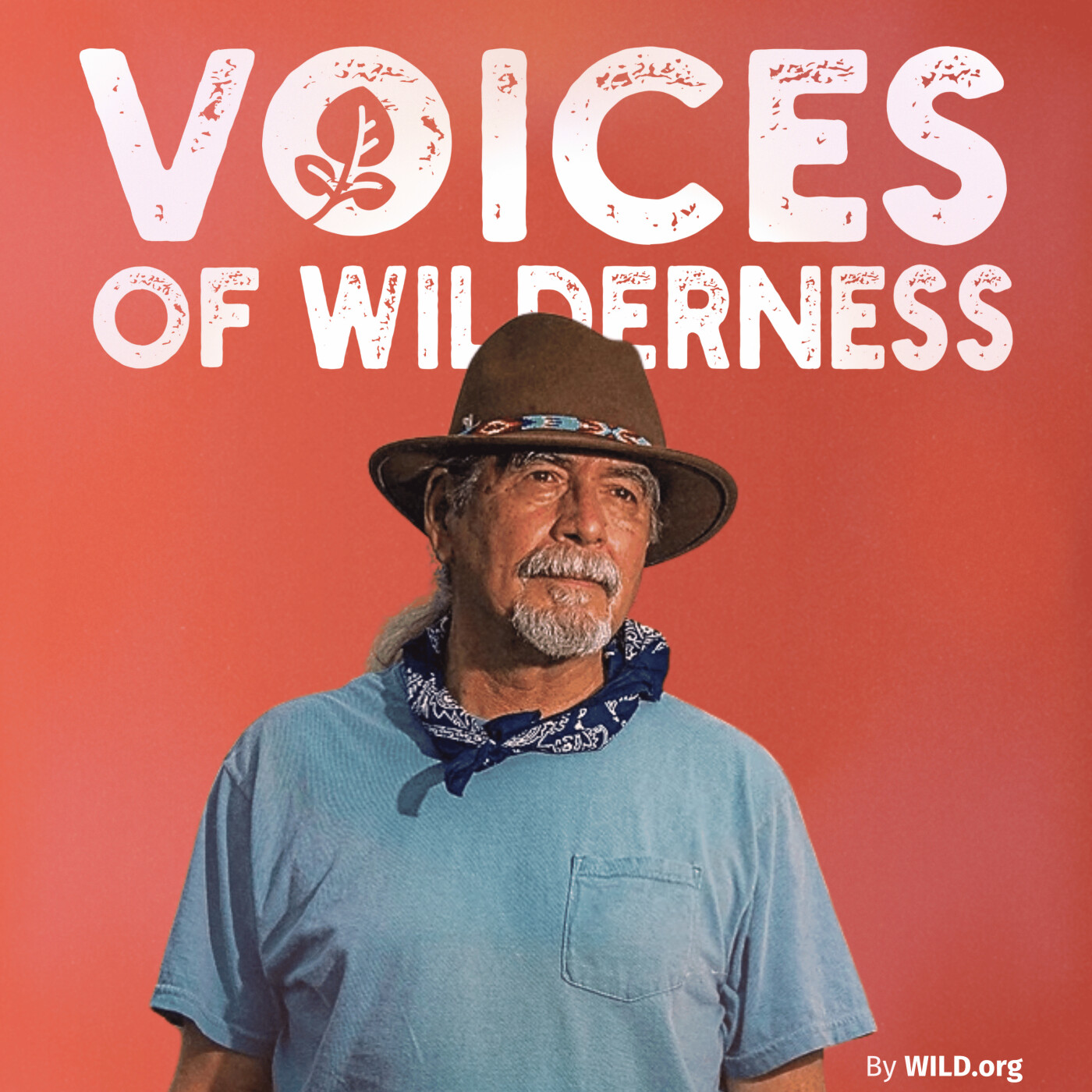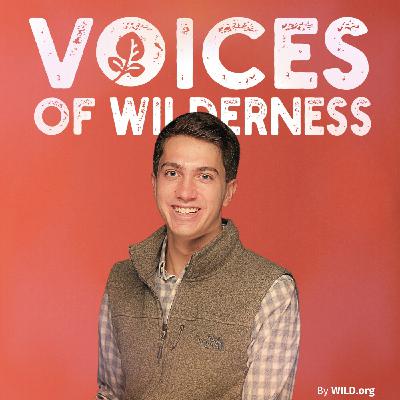Discover Voices of Wilderness
Voices of Wilderness

Voices of Wilderness
Author: WILD.org
Subscribed: 4Played: 37Subscribe
Share
© WILD Foundation
Description
Welcome to Voices of Wilderness, the WILD.org podcast where Jackie B., your host and fellow wilderness lover, discusses the environment, wildlife, and wilderness with experts in a down-to-earth non-expert way. Jackie’s a geek for nature facts and stories—scientific, cultural, educational you name it! While she’s not pretending to know everything (not even close), she’s here to bring her passion and the passion of others straight to you. Because let’s face it, it’s going to take all of us to figure out what’s really happening with our planet and how we can make a difference together.
Hosted on Ausha. See ausha.co/privacy-policy for more information.
66 Episodes
Reverse
Viviana Solange Yanez Gomez is the force behind 18,000 Trees in Ecuador, a country famous for its incredible biodiversity, cities, and landscapes.Although Viviana grew up surrounded by nature–hiking mountains and forests, she simultaneously watched these ecosystems get damaged. That early experience sparked her path toward conservation.After graduation, she worked in environmental education with children on Ecuador’s coast, learning firsthand the power of community-driven solutions.Today, she leads 18000 Trees, 18000 Puembeños, a community-led urban reforestation project in Puembo, Quito. Their goal? To plant 18,000 trees–one for every resident–over six years, restoring ecosystems, creating habitats, reconnecting green spaces, and building climate resilience. By linking parks, ravines, and neighborhoods through bio-corridors, the project boosts biodiversity, cleans air and water, and even cools the city. And it’s all rooted in community work, youth and women engagement, and environmental education.Viviana is also an alum of CoalitionWILD’s EXCELerator FLEX program. With applications for the 2026 EXCELerator program opening on October 27th and running through November 24th, we thought there couldn’t be a better time to sit down and chat with such an inspiring individual. For those who don’t know, the EXCELerator program is a six-month intensive program that trains emerging conservation leaders to turn ideas into real-world action projects.Before listening to the episode, please consider supporting our work at WILD.org, which allows us to dedicate time to creating these conversations for you.Hosted on Ausha. See ausha.co/privacy-policy for more information.
Gwen Bridge is a member of the Saddle Lake Cree Nation from Alberta, Canada, and works in consulting and support for Indigenous nations and their partners across North America.In today’s episode, Gwen joins us to talk about Motion 107 – “Scaling Up Indigenous Leadership in the Protection of Biodiversity and the Sacred” and Motion 96 – “Setting Area-Based Targets on Scientific Evidence and Reversing Historic Injustices.” These motions, submitted by WILD.org and co-sponsors, continue the work that was initiated at the 12th World Wilderness Congress. During the IUCN World Conservation Congress (WCC) in Abu Dhabi this October, member organizations will gather in person to debate and vote on these motions live on the floor of the Assembly.If we’re serious today about building more equitable relationships and societies, about bringing different visions together, we need to start with respect–respect for people’s perspectives, cultures, and ways of being. This is where harmony begins. For many Indigenous peoples, that also means recognizing sacred sites and spirituality as essential dimensions of a meaningful life. These sacred relationships matter–not just for culture, but for conservation.In this episode, Gwen talks about centering Indigenous leadership in protecting sacred species and spaces, weaving Indigenous knowledge and wisdom together with scientific conservation models, why protecting Half the planet is neither too ambitious nor unrealistic, and much more.Motion Guides:Motion 096: https://wild.org/wp-content/uploads/2025/07/Motion-096-Marketing-Brief-3.pdfMotion 107: https://wild.org/wp-content/uploads/2025/07/Motion-107-Marketing-Brief.pdfBefore listening to the episode, please consider supporting our work at WILD.org, which allows us to dedicate time to creating these conversations for you.Hosted on Ausha. See ausha.co/privacy-policy for more information.
Vivian Delgado is Joma and Tiwa. Her mother’s people are from Taos territory, which spans Northern New Mexico into Colorado, where Vivian currently lives. She has an academic background in Indigenous studies and is doing extensive work with treaties and treaty-making. Vivian also serves as a consultant for the Texas Tribal Buffalo Project, where she works on regenerating American bison populations. In today’s episode, Vivian joins us to talk about Motion 107 – “Scaling Up Indigenous Leadership in the Protection of Biodiversity and the Sacred” and Motion 96 – “Setting Area-Based Targets on Scientific Evidence and Reversing Historic Injustices.” These motions, submitted by WILD.org and co-sponsors, continue the work that was initiated at the 12th World Wilderness Congress. All were passed by over 700 delegates from around the world, and now, the proposed motions are heading to a vote in October at the 2025 International Union for Conservation of Nature’s (IUCN) World Conservation Congress Members’ Assembly.Indigenous knowledge and traditions have been diminished by laws and protections that primarily benefited non-Indigenous peoples. Indigenous leadership often comes late to the table, and navigating federal land bureaucracy can be complex. Efforts intended to protect land and species have frequently been reversed, leaving corruption and mismanagement in their wake. This has contributed to the biodiversity and climate crises we face today.We need to slow down, halt the destruction of global natural environments, and recognize that Indigenous knowledge—passed down through generations—is central to addressing these challenges.In this episode, Vivian shares why sacred sites and spiritual relationships with nature are essential to conservation, why centering Indigenous leadership is critical for protecting sacred species and spaces, why IUCN Members must align area-based conservation targets with the scientific call to protect at least 50% of the planet, and much more.Motion Guides:Motion 096: https://wild.org/wp-content/uploads/2025/07/Motion-096-Marketing-Brief-3.pdfMotion 107: https://wild.org/wp-content/uploads/2025/07/Motion-107-Marketing-Brief.pdfBefore listening to the episode, please consider supporting our work at WILD.org, which allows us to dedicate time to creating these conversations for you.Hosted on Ausha. See ausha.co/privacy-policy for more information.
Fátima Gigante is the Program Coordinator at CoalitionWILD. She began as a volunteer leading the Global Mentorship Program and now also manages the Accelerator Program—CoalitionWILD’s two flagship initiatives. With mentorship at the heart of both CoalitionWILD and WILD’s work, Fátima has been closely involved in shaping the IUCN World Conservation Congress Motion 97: “Mainstreaming mentorship for young ecological stewards to enhance conservation efforts” by writing, designing, and presenting it.In today's episode, Fátima joins us to talk about this important motion.The motion took root at the 2020 IUCN World Conservation Congress in Marseille, following Motion 76 on the Role of Children and Youth in Nature Conservation. Motion 97 builds on that foundation—and on the 12th World Wilderness Congress’s Resolution 4—by recognizing mentorship as a key tool for transformative conservation. It is now heading to a vote at the upcoming Members’ Assembly.What does this mean? During the IUCN World Conservation Congress (WCC) in Abu Dhabi in October, Member organizations will gather in person to debate and vote on these motions live on the floor of the Assembly.This is a critical moment where alliances, visibility, and strong advocacy can make all the difference in whether a motion is adopted or rejected.Okay but why is this so urgent? Because environmental challenges today demand more than technical expertise, they call for intergenerational collaboration and leadership renewal. Mentorship is essential to ensure younger generations are prepared to lead.In this episode, Fátima shares what meaningful mentorship in conservation really looks like, how to make programs accessible and culturally grounded, and how mentorship can foster both protection and resilience.Motion Guide: https://wild.org/wp-content/uploads/2025/07/Motion-097-Marketing-Brief.pdfBefore listening to the episode, please consider supporting our work at WILD.org, which allows us to dedicate time to creating these conversations for you.Hosted on Ausha. See ausha.co/privacy-policy for more information.
Anja Fjellgren Walkeapää is a reindeer herder in the southern part of the Swedish side of Sápmi. Her reindeer graze in a herding community called Mittådalen Mittahduhlen, and with a master’s degree in forestry, Anja has also worked at the Swedish Forest Agency as a national-level specialist in reindeer herding.In today’s episode, Anja joins us to talk about Motion 131 – Protecting the Sápmi Forest: Safeguarding Biodiversity and Indigenous Livelihoods. This motion, submitted by WILD.org and co-sponsors as part of our work with our WILD Sápmi program and as a continuation of the 12th World Wilderness Congress’s Spontaneous Resolution 12, is heading to electronic vote at the 2025 International Union for Conservation of Nature’s World Conservation Congress.What does this mean? From August 27 to September 10, IUCN members will vote online to decide whether the motion passes. This decision will be made digitally. That’s why we need to make as much noise as possible, right now, to help ensure IUCN delegates vote in favor of it.Sweden is eradicating old-growth forests at a rate six to seven times faster than the Amazon is being destroyed. Sámi reindeer herders have been some of the strongest defenders of these ancient forests, but without international support, they face overwhelming odds.Motion 131 calls for a halt to the destruction of old-growth boreal forests in Sápmi and for the recognition and elevation of Sámi traditional knowledge and leadership in sustainable forest stewardship.In this conversation, Anja explains explain what’s truly at stake if Sweden’s old-growth boreal forests continue to disappear at this pace, how Motion 131 aims to change that trajectory, why the traditional knowledge she was raised with is essential for effective conservation—and how she responds to the motion rejectors - those who claim this motion is a threat to economic growth.Motion Guide: https://wild.org/wp-content/uploads/2025/07/Motion-131-Marketing-Brief.pdfBefore listening to the episode, please consider supporting our work at WILD.org, which allows us to dedicate time to creating these conversations for you.Hosted on Ausha. See ausha.co/privacy-policy for more information.
Is everything we know about wildlife rooted in science—or is it shaped by cultural beliefs? What role does culture actually play in the disappearance of species? Sometimes, how we act toward animals is guided not just by facts, but by the stories we grew up with—stories that may be misleading, that have driven species to the brink, and that complicate our ability to coexist.You probably grew up hearing tales of the ‘big bad wolf’ or the image of gentle bears enjoying honey. It’s ingrained in us to think something about these animals, whether negative or positive. With Claire, we’ll unpack these stories.Most importantly, how have these narratives influenced how we’ve erased these animals from our landscapes—and how are we now reintroducing them?Today, we explore these fascinating questions with Claire Galloni D’Istria, a biologist and anthropologist whose work focuses on two iconic Alpine species: wolves and bears.Before listening to the episode, please consider supporting our work at WILD.org, which allows us to dedicate time to creating these conversations for you.Hosted on Ausha. See ausha.co/privacy-policy for more information.
A humanitarian and ecological crisis is rapidly unfolding in the southeastern lowlands of Kenya, in the shadow of Mount Kilimanjaro.Over 200 Indigenous families are facing eviction from ancestral lands they have lived on for generations.Since July 2nd, 2025, fencing poles have been erected around entire settlements—cutting off vital routes that have connected communities, livestock, and wildlife for centuries.They are being locked out of the main road. Locked out of their rivers. Locked out of sacred sites. Their freedom of movement—and with it, their daily lives—is being shattered.At the heart of this crisis is Mkocheni, a fragile community nestled within the Lake Jipe ecosystem—known as The Community That Lives With Elephants. This rare wetland sustains not only elephants, hippos, and hyenas, but also migratory species that depend on its delicate balance.Here, Maasai herders, artisanal fishers, and pastoralists live in deep connection with the land. But this shared land is now being targeted for agricultural expansion—threatening both human life and biodiversity.If we do not act now, we risk losing not only a people’s home—but one of East Africa’s most vital ecological and cultural heritage sites.Joining us is Zachary Mutinda, Project Lead of the Eco Jipe Program. Zach was part of WILD’s CoalitionWILD 2021 Excelerator Cohort. He describes what he sees as a ticking time bomb in one of the region’s biggest possible human-wildlife conflict hotspots.We’re honored to have him with us today—to help us better understand the on-the-ground reality, the deep knowledge of local communities, the role of wildlife, and how each of us can take action for this community and the conscience crisis that’s happening.📣 Update: The situation has worsened since the podcast was recorded. Vegetation has been cleared, which negatively affects both elephants and their corridors. Zach is concerned about the human impact this will have in the coming days and months.Learn more: https://wild.org/blog/indigenous-struggle-for-land-in-kenyas-lake-jipe-region/Before listening to the episode, please consider supporting our work at WILD.org, which allows us to dedicate time to creating these conversations for you.Eco Jipe Program: https://ecojipeprogram.org/Hosted on Ausha. See ausha.co/privacy-policy for more information.
Todd likes to focus on three main ideas that many of us in this community are well acquainted with, and yet rarely stop to unpack them. First: wild places. Second: rewilding. And third: how to prevent ‘de-wilding’ or the quiet deletion of the natural world?Todd Wilkinson has been a journalist for over 40 years. Believe it or not, he began his career as a violent crime reporter in Chicago, but his roots trace back to just north of Minneapolis—a place where nature was often seen as something to use, not protect. That perspective shifted when he became an environmental journalist, writing for National Geographic, The Guardian, and many others. Much of his recent work focuses on the Greater Yellowstone Ecosystem. This is the last great wild system in the lower 48 that still has all of its large, charismatic species intact.Today, as more people live in cities and suburbs, Todd observes what he calls an epidemic of ‘ecological illiteracy’. This is why he sees his work not just as journalism, but as a kind of activism—not pushing a specific agenda, but insisting that we ground our decisions in fact. A concept that might seem foreign and lost these days…He’s written extensively about our relationship with animals like wolves and bears, not to romanticize them, but to ask real questions like: Does wildlife matter? Do we want it to be here for future generations? And if so, are we ready to change how we live to make that possible?Before listening to the episode, please consider supporting our work at WILD.org, which allows us to dedicate time to creating these conversations for you.Hosted on Ausha. See ausha.co/privacy-policy for more information.
Maggie Dewane set out to travel across all 50 states of the U.S., capturing the essence of each one through poetry, specifically haikus, and she did all of this for nature.For a while, climate change could feel like a distant, abstract threat to some of us. But now, it’s no longer far away. It’s here, showing up in our own backyards.So Maggie asked herself: How do I make others care and feel what’s going on around them? Her answer was to write—short, heartfelt pieces of art that could resonate with everyone in the U.S. because while each state is different, they’re all bound by something shared: their nature, their living beings, their wild and quiet spaces. And, unfortunately, they’re all going to experience the impacts of climate change in one way or another.Maggie takes a unique approach to describe each state, first by sharing the current, breathtaking beauty of each location. She then juxtaposes her initial haikus with what each state might look like once climate change has left its mark through threats of rising sea levels, wildfires, droughts and more. Maggie works professionally in environmental communications, but her love for storytelling goes beyond her day job. She’s also a writer, journalist, filmmaker—someone who uses every medium she can to share one core message: nature is worth protecting.In this episode, you’ll journey with Maggie through the making of her book: the research, the writing, the stories she uncovered, and the impact she hopes to create.Before listening to the episode, please consider supporting our work at WILD.org, which allows us to dedicate time to creating these conversations for you.Hosted on Ausha. See ausha.co/privacy-policy for more information.
Looking back, it’s hard to find a time when humans weren’t part of the natural landscape. We’ve shaped the land for millennia, and conversely, the land has shaped us - yet, we often talk about nature as something separate from us. How do we redefine our relationship with the land when it’s always been somewhere within us?For decades, we’ve tried to manage and control natural spaces. And while many efforts come from a place of care, they don’t always lead to the outcomes we expect. The introduction of invasive species, fire suppression, and attempts to manipulate entire ecosystems have often caused more harm than good.Now, as climate change accelerates the migration of certain species—plants and animals moving beyond their historical ranges—we’re faced with new dilemmas. Should we intervene to help them? Or step back and let nature take its course?Our guest, Dan Abbe, shares stories from a lifetime in wild places—from forest ranger work to time in the Peace Corps—offering insight into what it means to care for land without trying to control it. We reflect on the legacy of the 1964 Wilderness Act, the risks of "helping" nature, and the need to reimagine wilderness not as a space without people, but as a living system deeply entangled with human responsibility.Before listening to the episode, please consider supporting our work at WILD.org, which allows us to dedicate time to creating these conversations for you.Hosted on Ausha. See ausha.co/privacy-policy for more information.
Today, we’re bringing you into the heart of our latest journey—one that began at the 12th World Wilderness Congress and is now heading to the IUCN World Conservation Congress in October of this year, 2025, in Abu Dhabi.It all started with important resolutions passed at WILD12, many started by passionate individuals outside of the environmental policy realm, addressing key conservation issues that WILD works on every day. Following the Congress, WILD and a variety of co-sponsors worked to transform several of these resolutions into formal motions for submission to the IUCN World Conservation Congress. These motions, four of which were proposed, have now all been accepted— this is just the beginning of our journey on the road to Abu Dhabi.So what happened between WILD12 and now? How did these resolutions evolve into official motions? Why are they important? And more importantly—how can you be part of what’s next? Environmental policy can be a tricky world for a person like you or I to understand and even play a part in. We’re breaking everything down for you today so that you can join us in keeping Earth wild at a global scale.Before listening to the episode, please consider supporting our work at WILD.org, which allows us to dedicate time to creating these conversations for you.Hosted on Ausha. See ausha.co/privacy-policy for more information.
Jenny Dallan, a young environmental professional, works for Ontario Parks, coordinating school programs across the province. Don Carruthers Den Hoed works at the University of British Columbia, where he leads the Canadian Parks Collective for Innovation and Leadership.Jenny applied to a mentorship program offered by the organization Don runs. Though she wasn’t selected, they exchanged a few emails—Jenny was looking for feedback to improve her application. After a bit of back-and-forth, Don encouraged her to apply to the CoalitionWILD Global Mentorship Program, which if you don’t know is one of our programs here at WILD.org. She applied as a mentee. He applied as a mentor.Jenny was initially paired with someone else, but when her original mentor backed out due to personal reasons, she ended up matched with Don! Clearly, these two were meant to teach each other some valuable working lessons.And both of them agree that their experience with the mentorship program was transformative… It wasn’t a case of one person teaching while the other learned. It was about uplifting each other, in both directions. That’s what we call intergenerational work. And that’s what creates hope. And, if we're being honest, it feels like we could use more of that these days: hope AND different generations working together in a productive manner.So, what really was Jenny and Don’s experience in the Global Mentorship Program? How did Don support Jenny through the challenges she faced? How did they find common ground? Why are these relationships critical right now and where are they now, months after the program ended? Apply to CoalitionWILD's 2025 Global Mentorship Program: https://docs.google.com/forms/d/e/1FAIpQLScsOaJnAM3YerractksUmZh9-25TMoelp5IwNUSRSVBhjNg4Q/viewformBefore listening to the episode, please consider supporting our work at WILD.org, which allows us to dedicate time to creating these conversations for you.Hosted on Ausha. See ausha.co/privacy-policy for more information.
Everything began with a plan by U.S. fossil fuel companies in Texas to export natural gas to the vast markets of China. But instead of building expensive infrastructure through the U.S., developers looked south, proposing an almost 500-mile/800-kilometer pipeline starting in Guadalupe, Chihuahua, cutting across the deserts of Chihuahua and Sonora, and ending at the northern edge of the Sea of Cortéz.There, the plan includes building a massive liquefaction plant and an industrial port to handle 300-meter-long/almost 1,000 feet long methane tankers—carrying up to 15 million tons of liquefied natural gas every year to China, South Korea, Japan, and the broader Asian market.Now, there are a lot of issues with all of this but today we’re going to be focusing on one that’s relevant to our work: the protection of irreplaceable biodiversity. The gas-carrying tankers that would be traveling up and down the Sea of Cortez are blazing through one of the most fragile and biologically rich marine environments on the planet.This sea, stretching 1,000 miles, is home to 39% of the world’s marine mammal species. It’s where whales mate, calve, and raise their young in the warm, calm waters. Dolphins, porpoises, and hundreds of fish species depend on this sanctuary—about 90% of which are found nowhere else on Earth. So this brings us to today’s guest, Beatriz Padilla, wilderness advocate and painter. She has embarked on an extremely brave hunger strike to oppose the relentless passage of tankers through one of the planet’s most vital marine ecosystems. Beatriz is a longtime friend of ours at WILD.org, and we’re proud to stand with her in protecting wild lands. In this episode, we dive into her mission—and how she’s using her art and her body to defend the wild.Before listening to the episode, please consider supporting our work at WILD.org, which allows us to dedicate time to creating these conversations for you.How to support Beatriz:Financial support: Contribute to the campaign's expenses via GoFundMe: https://gofund.me/37f468ff Sign the petition: Add your voice to the Avaaz campaign: https://secure.avaaz.org/campaign/en/mexico_whales_and_tankers_1_3/ Follow and share the Whales or Gas campaign: https://whalesorgas.org/ Spread the word on social media using hashtags #WhalesOrGas #ProtectMexicoWhales Learn more about the project: https://beatrizpadilla.org/vocesdeloceanoenglish.html Follow the campaign on social media: Facebook: https://www.facebook.com/beatrizpadillaartistavisual/ Instagram: https://www.instagram.com/beatrizpadillaartistavisual/ YouTube: https://www.youtube.com/@BeatrizPadilla-j6b Hosted on Ausha. See ausha.co/privacy-policy for more information.
Picture this: a vast, untouched wilderness stretching across the horizon–a land so pristine it feels like it’s been frozen in time. It’s almost hard to put words to such a place, it’s truly like another planet. This wilderness, specifically in Utah, is home to some of the last wild lands in the lower 48 of the United States, with ecosystems that help regulate our planet’s climate but sadly, it’s under constant threat.Mining companies, extractive industries, and high traffic tourism are moving in, trying to use the land for profit. These activities don’t just harm the land–they endanger fragile ecosystems that take centuries to heal. In Utah, where the wilderness is vast and breathtaking, the danger of these practices spreading is all too real. But there is hope.People like Chris Ricardo, today’s guest, a regional organizer for the Southern Utah Wilderness Alliance, are working hard to protect these lands. These folks are on the front lines of very real battles to protect some of the most precious places - raising awareness, pushing for laws like the America’s Red Rock Wilderness Act, and getting support from people all over the country.In this episode, Chris talks about why these wilderness areas are so valuable–they belong to all of us. He explains how ordinary people can make a real difference, and why protecting these places really matters. He also shares the important work being done by Indigenous groups, like the Bears Ears Inter-Tribal Coalition, who are fighting to protect sacred lands for future generations.The threats are serious, but if we all work together, we can protect these wild places. Chris and others are leading the way–now it’s up to us to follow the path they’re blazing. Before listening to the episode, please consider supporting our work at WILD.org, which allows us to dedicate time to creating these conversations for you.Hosted on Ausha. See ausha.co/privacy-policy for more information.
A UNESCO World Heritage site in the Indian Ocean and home to over 400 endemic species, the Aldabra Atoll, is on the brink of destruction. A proposed luxury development has threatened its fragile ecosystem, and despite scientific arguments and official interventions, nothing has stopped the Seychelloix government from proceeding with this project. Nothing seemed to get their attention. In the end, it wasn’t data or diplomacy that began turning the tide for Aldabra, it was storytelling.Today’s guests, Celina Chien, conservationist, journalist, and founder of Overstories, and Victoria Duthil, a Seyhelloix scientist-turned-advocate dedicated to protecting her home’s biodiversity have both been instrumental in the Friends of Aldabra movement, which has harnessed the power of narratives to inspire action.In this new podcast episode, we’re exploring the intersection of storytelling, culture, and conservation. How often have cold facts failed to move you, yet a story changed everything? Why does that happen? How can you use storytelling as a force for change? And how can young, powerful voices shape the future of conservation?Before listening to the episode, please consider supporting our work at WILD.org, which allows us to dedicate time to creating these conversations for you.Hosted on Ausha. See ausha.co/privacy-policy for more information.
Global conservation policy can feel complex: What are these big events, and why do they matter? COPs, Conventions of Parties, and member-only congresses—these spaces can seem intimidating, filled with jargon, fancy terms, and big players. You can often find yourself lost, not only in understanding what they mean, but in grasping how they work and, more importantly, what is your place in them is as an individual who cares about the planet. And sometimes, they can feel so slow, right? The urgency of what’s happening is clear, but the slow-moving wheels of decision-making often don’t seem to match the pressing need for action. Despite this, these events remain crucial in shaping environmental policy on a global scale.With the climate and biodiversity crises at the forefront, these gatherings bring together not just scientists and policymakers, but also Indigenous and local communities—groups often overlooked, yet whose voices are key in driving meaningful change.Today, with WILD.org friends Yen Parico, Program Director of CoalitionWILD at WILD.org, and Aiita Joshua Apamaku, Wildlife Biologist and NatGeo Explorer, we’re diving into the importance of these conventions, how they shape the global conservation agenda, and how we, as individuals, can engage with the outcomes.Before listening to the episode, please consider supporting our work at WILD.org, which allows us to dedicate time to creating these conversations for you.Hosted on Ausha. See ausha.co/privacy-policy for more information.
Wilderness seems like an innate, normal, natural concept. ‘Wilderness is the story of the planet.’ That’s what Chad Dawson, today’s guest, says at least. Wilderness is also the story of humanity. Yet, here we are, forgetting our roots and how to live in conjunction with the land. So, how did we get here?In this episode, we dive into wilderness management with Chad Dawson, retired professor and key figure behind the Wilderness Management (5th edition that is) textbook—a comprehensive guide that’s shaped how we understand and preserve our wildest lands. With decades of experience in natural resource management, Chad unpacks the complexities of wilderness—not just as protected spaces, but as interconnected ecosystems with stories that span time.How do we preserve these landscapes for future generations? What does it mean to "manage" wilderness without interfering with its natural processes? And how can we learn from ancestral and traditional knowledge to do so?Join us as Chad guides us through the evolution of wilderness management, balancing human development with ecological preservation, and the vital role of education and research. What began in 1978 as an effort to define wilderness preservation has blossomed into global conversation—and today, we’re continuing that journey. Before listening to the episode, please consider supporting our work at WILD.org, which allows us to dedicate time to creating these conversations for you.Order the 5th Edition of Wilderness Management from Waveland Press: https://www.waveland.com/browse.php?t=802Hosted on Ausha. See ausha.co/privacy-policy for more information.
The world is hurting. People are hurting. We see it every day, all around us. It’s almost inescapable in the news. Ancestral knowledge is fading because of modern ways of life. But within these wounds, there is healing—ancient wisdom, strength, really a way back to wholeness.“The medicine is in the wound.” Ariel’s words that have stuck with Jackie since her conversation with her. A reminder that healing doesn’t come from ignoring pain but instead comes from facing it and tending to what is broken. To find our humanity again, we must first look at what has been lost. This is not an easy path. It requires us to listen.It’s about remembering the wisdom we were told to leave behind. It is about imagining a world where stewarding nature isn’t about control.The wound is open. The medicine is readily available but the real question is, are we ready to heal?This is just the very tip of the iceberg of Jackie's conversation with Ariel Clark, an enrolled tribal citizen of the Grand Traverse Band of the Ottawa and Chippewa Indians. Through her mother’s family, she also carries Northern European, Scandinavian, French, Irish, and Scottish ancestry—an experience that has helped her understand what it means to live between two worlds. Through her journey, Ariel has learned what connects us as humans and where we need to look to find our shared humanity—for the good of our future.Before listening to the episode, please consider supporting our work at WILD.org, which allows us to dedicate time to creating these conversations for you.Connect with Ariel: https://www.linkedin.com/in/ariel-clark-97366a3/ Ariel's sources:The Psychedelic Bar Association: Law & Ethics Series, The Psychedelics Industry & Indigenous PeoplesRoots To Sky Sanctuary https://www.rootstosky.net/Life Comes From It https://www.lifecomesfromit.org/Nokomis Cultural Heritage Center https://nokomis.org/Water Song https://youtu.be/ks5IIzYX3t8?list=PLWSo5XdPnV6wN9UcvokmhWFDDInlErONfHosted on Ausha. See ausha.co/privacy-policy for more information.
Einstein stated, "We cannot solve our problems with the same thinking we used when we created them." This idea came to Jackie's mind during her conversation with the ever awesome Dan Wildcat at WILD12. He talks about "the age of the Anthropocene"—a time when humans see themselves as the center of everything. And here we are, facing human-caused environmental crises, thinking once again that it’s our role to fix things in the same manner we’ve done in the past.Dan’s got something to say about that mindset. He says this isn’t about fixing—it’s about healing. If we can step away from this self-centered way of thinking, we might begin to rebuild a connection with nature—a relationship rooted in kinship and respect, where we understand that we’re part of a much larger family.In today’s episode, we’re diving into these ideas and so much more with Dan. For those who don’t know him, Dan Wildcat is a Yuchi member of the Muscogee Nation of Oklahoma and a passionate advocate for bringing Indigenous wisdom to the fight against climate change.Before listening to the episode, please consider supporting our work at WILD.org, which allows us to dedicate time to creating these conversations for you.Hosted on Ausha. See ausha.co/privacy-policy for more information.
How can Indigenous communities be better supported in addressing wildlife diseases?This question has inspired Avery’s work.Avery, a citizen of the Cherokee Nation, is working to bring together veterinary science and Indigenous knowledge by partnering with tribal nations on wildlife health research that’s collaborative and community-driven.Having grown up in his tribal community, Avery saw that while many tribes in the U.S. have natural resource departments focused on wildlife protection, they often lack the veterinary expertise needed to tackle wildlife diseases.His goal is to become one of the first tribal wildlife veterinarians, combining these two fields to help tribes protect their ecosystems.Before listening to the episode, please consider supporting our work at WILD.org, which allows us to dedicate time to creating these conversations for you.Connect with Avery: https://www.linkedin.com/in/avery-tilley-5a2095197/Hosted on Ausha. See ausha.co/privacy-policy for more information.


